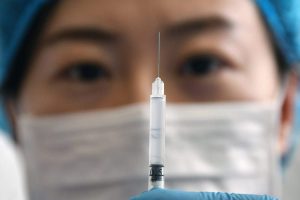The EU's vaccine rollout is going so badly that Russia and China are now stepping in to take advantage

- The EU’s vaccination rollout is going so badly that China and Russia are now moving to sell their own supplies to Europe.
- China and Russia are using the contracts as leverage to extract concessions from Europe.
- The development has wide-ranging implications for relations between the powers and the West.
- Visit the Business section of Insider for more stories.
The EU’s vaccination rollout is going so badly that China and Russia are now stepping in to make up the difference, with wide-ranging consequences for relations between the two powers, Europe and the US.
“In both cases, there is a geopolitical agenda,” said Dalibor Roháč, a resident scholar at the American Enterprise Institute, in an interview with Insider this week.
“If Chinese and Russian vaccines are effective and help [European] countries emerge out of the pandemic sooner than their neighbors, China and Russia will have bought themselves a whole of goodwill in the region — at the expense of Brussels and Washington — which they can cash in at a time of their choosing,” he said.
The EU’s vaccine programme is failing
The European Commission has come under intense criticism in recent weeks for the slow progress of its vaccination effort, which was coordinated centrally from Brussels to avoid leaving smaller states behind.
A number of factors including dwindling supplies, production problems, and a dramatic row with drug firm AstraZeneca mean that the EU has received far fewer vaccines than it ordered, prompting Germany’s finance minister to brand the efforts “a total shitshow.” Russia and China are more than happy to try and fill the void.
Hungary was the first European member state to lose patience with Brussels and go its own way on vaccines. After its avowedly Eurosceptic prime minister Viktor Orban declared “I’m not waiting,” he ordered 5 million doses of China’s state-backed Sinopharm vaccine and 2 million doses of Russia’s Sputnik V vaccine, fast-tracked their approval, and began administering both jabs in February.
Other European countries including Poland, Austria, the Czech Republic, and Slovakia have now started eyeing Russian or Chinese vaccines too, Politico reported, despite the fact neither has been approved for use by the EU’s medicines agency.
The move would fatally undermine the EU’s approach to procuring vaccines but for those countries, the calculation is a simple one.
“Politically for these smaller countries, their economies really need it. It’s hard to say no,” said Theresa Fallon, director of the Centre for Russia Europe Asia Studies (CREAS) in Brussels, in an interview with Insider.
“Everyone is struggling to get a vaccine, and if there’s an efficient one that they can get their hands on for not a lot of money they’ll take it. I don’t think they’ll think twice about it. The rollout of the vaccine program in Europe has been shambolic.”
Russia and China are using Europe’s failure to their advantage
Data published by the health journal Lancet indicated that the Sputnik V jab was highly effective in preventing COVID-19, but Russia has not vaccinated much of its own population and there is speculation that it may be struggling with vaccine production — though an agreement reached in Italy to produce 10 million jabs this week may improve that situation from July.
China’s vaccines, meanwhile, are already being delivered worldwide but Beijing has refused to publish comprehensive safety data for the Sinovac and Sinopharm jabs. Fallon also said that fake vaccines containing mineral water and saline solution which were shipped abroad from China may undermine trust in their efforts to distribute vaccines to other countries.
If Russia and China can deliver on their vaccine promises, it will be far more than a good public relations exercise for both regimes. It could also provide them with geopolitical leverage which makes it harder for countries to impose sanctions and easier to ignore bad faith actions.
“China is using [its vaccines] not only to win hearts and minds. It’s clearly very transactional,” said Theresa Fallon.
Beijing has already demonstrated its willingness to use its vaccine as a tool for political gain, reportedly delaying a shipment of its Sinovac jab to Turkey as it sought to extract an agreement from the Turkish government on the extradition of Uighur Muslims.
“Both regimes will seek to extract concessions later on,” said Dalibor Roháč.
“It will be harder to make the argument for imposing further sanctions on Russia when Putin decides to stir trouble in the neighborhood if a number of member states are indebted to Moscow for turning the pandemic around.
“Likewise, it will be more difficult to make the case even for a partial decoupling with China if Chinese vaccines play a role in the recovery.”
Get the latest coronavirus business & economic impact analysis from Business Insider Intelligence on how COVID-19 is affecting industries.
Source: Read Full Article
